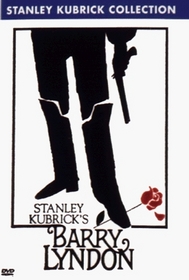| Actors: Ryan O'Neal, Marisa Berenson, Patrick Magee, Hardy Krüger, Steven Berkoff Director: Stanley Kubrick Creators: John Alcott, Stanley Kubrick, Tony Lawson, Bernard Williams, Jan Harlan, William Makepeace Thackeray Genres: Indie & Art House, Drama, Military & War Sub-Genres: Indie & Art House, Love & Romance, Family Life, Military & War Studio: Warner Home Video Format: DVD - Color,Widescreen,Letterboxed - Closed-captioned,Live DVD Release Date: 06/29/1999 Original Release Date: 12/18/1975 Theatrical Release Date: 12/18/1975 Release Year: 1999 Run Time: 3hr 4min Screens: Color,Widescreen,Letterboxed Number of Discs: 1 SwapaDVD Credits: 1 Total Copies: 0 Members Wishing: 6 MPAA Rating: PG (Parental Guidance Suggested) Languages: English, French Subtitles: English, French See Also: |
Search - Barry Lyndon (Ws) on DVD
  | Barry Lyndon Ws Actors: Ryan O'Neal, Marisa Berenson, Patrick Magee, Hardy Krüger, Steven Berkoff Director: Stanley Kubrick Genres: Indie & Art House, Drama, Military & War PG 1999 3hr 4min In 1975 the world was at Stanley Kubrick's feet. His films Dr. Strangelove, 2001: A Space Odyssey, and A Clockwork Orange, released in the previous dozen years, had provoked rapture and consternation--not merely in th... more » |
Larger Image |
Movie DetailsSimilar Movies
Similarly Requested DVDs
|
Member Movie ReviewsReviewed on 3/14/2025... Classic slowburn but not the greatest coming from Kubrick.
Movie ReviewsThis release is NOT 16x9 enhanced! bunkaroo | Chicago West Suburbs, IL United States | 10/24/2007 (1 out of 5 stars) "I just received this exact DVD from Amazon. Although the package art now carries a 2007 date, the disc inside is the same as the 2001 release. It is NOT anamorphically enhanced. In fact, the files on the DVD are dated 2001, so it literally is the exact DVD release in 2001 - the menu is the same as well. The only difference is this comes in a keep case rather than a snapper case. Such a shame that WB won't do better by this overlooked masterpiece." Underrated Kubrick Masterpiece David Baldwin | Philadelphia,PA USA | 08/07/2004 (5 out of 5 stars) "I am an unabashed Kubrick fan. I was initiated into his work with "A Clockwork Orange" when I was 16 and went from there. Why is it that "Barry Lyndon" has in my mind surpassed other more revered works. You can cite the magnificent technical attributes of the film(cinematography,art direction, costume design,music), however, a technically proficient movie is not necessarily a moving experience. I would have to say that what elevates this movie is the screenplay and the acting. Kubrick does a great job moving the story from Redmond Barry's youth to his downfall among the English aristocracy. Kubrick has also gathered a great cast of actors here in supporting roles(Parick Magee, Leonard Rossiter, Marie Kean, Godfrey Quigley, Steven Berkof, etc.). What cannot be overlooked is the performance of Ryan O'Neal. If some find him wooden or off-putting should consider that he is essentially playing an unsympathetic rogue. It is a daring performance and O'Neal is utterly convincing whether playing a headstrong teenager or a cold manipulator. One gripe about the DVDs in the Kubrick Collection: with the exception of "The Shining", the only extras on these discs are trailers." Lavish, engrossing, picaresque Dennis Littrell | SoCal | 02/06/2002 (5 out of 5 stars) "Stanley Kubrick's beautifully opulent production takes many liberties with William Makepeace Thackeray's picaresque romance, The Memoirs of Barry Lyndon, Esq (1843), narrated in the first person depicting events from the eighteenth century. In particular, Redmond Barry who becomes Barry Lyndon, is something of an admirable rake, whereas in Thackeray's novel he is a braggart, a bully and a scoundrel. No matter. Kubrick, in keeping with a long-standing filmland tradition, certainly has license, and Thackeray won't mind.Ryan O'Neal is the unlikely star, and he does a good job, rising from humble Irish origins to the decadence of titled wealth, employing a two-fisted competence in the manly arts, including some soldiering, some thievery at cards and a presumed consummate skill in the bedroom. Marisa Berenson plays Lady Lyndon, whom Barry has managed to seduce; and when her elderly husband dies, she marries Barry thus elevating his social and economic station in life. But Barry is rather clumsy at playing at peerage, and bit by bit manages to squander most of the Lyndon fortune until his stepson, Lord Bullingdon (Leon Vitali) grows old enough to do something about it.This really is a gorgeous movie thanks to the exquisite sets and costumes and especially to John Alcott's dreamy cinematography and a fine score by Leonard Rosenman. The 184 minutes go by almost without notice as we are engrossed in the rise and fall of Barry's fortunes. There is fine acting support from Patrick Magee as the Chevalier de Balibari and Leonard Rossiter as Captain Quinn, and a number of lesser players, who through Kubrick's direction bring to life Europe around the time of the Seven Years War (1754-1763) when decadence and aristocratic privilege were still in full flower.The script features two dueling scenes, the first showing the combatants firing at one another simultaneously at the drop of a white kerchief, the second has Barry and his stepson face each other ten paces apart, but due to the flip of a coin, the stepson fires first. Both scenes are engrossing as we see the loading of the pistols with powder, ball and ramrod, and we are able to note how heavy the pistols are and how difficult it must be to hit a silhouette at even a short distance. It is this kind of careful attention to directional detail that absorbs us in the action and makes veracious the story. Notice too the way the British soldiers march directly en mass toward the French guns. They actually used to fight battles that way! Also note the incredible pile of hair atop Lady Lyndon's head. Surely this is some kind of cinematic record. Bottom line: one of Kubrick's best, certainly his most beautiful film."
|
















